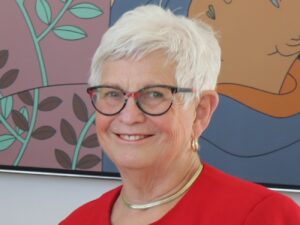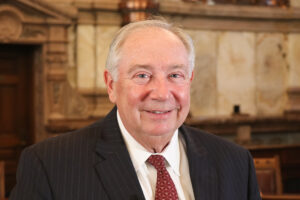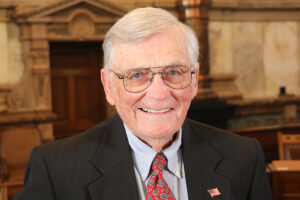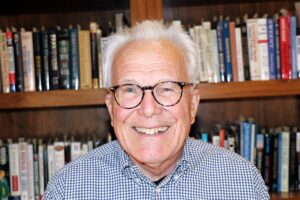Topic: Systems planning

Interview of Deanell Tacha, April 12, 2023
Interviewed by Jim Concannon
Jim Concannon guides retired federal Judge Deanell Tacha through an interview that probes her background, reasons for becoming a lawyer, and then a judge on the United States Court of Appeals, and her career in public service as an administrator and professor of law. Tacha spoke about how women were treated in law school and during her early law practice. She advocated for the advancement of women in law and the workplace. Tacha credited Kansas' U.S Senator Bob Dole for her nomination to the federal Court of Appeals. She compared the federal system of selecting judges Show Morewith the Kansas merit selection system and prefers the Kansas nonpartisan system. Tacha explained how the federal judiciary is organized, focusing on the kinds of cases they hear. She related a story about a trip she took to Albania to assist with developing a new constitution for the country, discussed her experience as Dean of the Law School at Pepperdine University, and closed with an observation about "thoughtful, civilized discourse". Show Less

Remembering Chief Justice Kay McFarland — Interview of Elaine Schwartz, April 25, 2023
Interviewed by Joan Wagnon
This short conversation with Elaine Schwartz, former legislator and Topeka city council person describes her friendship with Justice Kay McFarland and how Schwartz became trustee for McFarland's estate. The estate benefitted the Topeka Zoo and specifically, the Asian garden named for Justice McFarland.
Justice Kay McFarland was the first woman appointed to the Kansas Supreme Court and the first Chief Justice. Her career and life story can be found at this link: https://my.lastinglegacyonline.com/story/kay-mcfarland/

Interview of Howard Schwartz, April 25, 2023
Interviewed by Richard Walker
Howard Schwartz credits Wilt Chamberlain for encouraging him to leave Philadelphia and come to Kansas to college. Then Jim James asked him to set up a system to manage personnel in 110 courts located in the state's 105 counties. Schwartz spent the next 32 years managing change within the Kansas courts as the Judicial Administrator. This oral history interview covers court unification, the management of court dockets, the creation of child support guidelines, and the evolving relationships among courts and judges over how the system is administered. Schwartz developed a special friendship with Justice Kay McFarland Show Morewho asked him and his wife, Elaine to assist with the disposition of her estate. Schwartz wrote an article for the Kansas Bar Association publication about Chief Justice McFarland which is also available for download. Show Less

Interview of Ronald Wurtz, April 18, 2023
Interviewed by Nancy Parrish
As he tells it in this oral history interview, Ron Wurtz always wanted to be a lawyer. He chose Washburn University because they had a law school and a ROTC program. He interned with Shawnee County District Attorney Gene Olander as a law student, and after four years as an Air Force Judge Advocate, he returned to work as an Assistant District Attorney in Topeka before becoming a state public defender in 1979. Wurtz's interview covers -- the death penalty, to which he has always opposed, and sentencing guidelines, which he originally supported and later opposed. He discusses Show Moreseveral of the cases he worked on. More recently, he has worked on the Expungement Project and at the time of this interview, taught at the Washburn University Law Clinic. Occasionally he has also served as a judge pro tem. Show Less

Interview of Jim Denning, April 13, 2023
Interviewed by Alan Conroy
Jim Denning served four years as Majority Leader for the Kansas Senate. His interview reveals his Western Kansas leanings, despite having worked, lived and represented Johnson County. HIs legislative interests included health care policy, funding KPERS and school finance. He described Senate Bill 9--KU Cancer designation--as one of his important contributions. Denning found that Governor Brownback’s tax plan was creating problems for Kansas – “too deep and unsustainable.” His philosophy was, "At the end of the day, you have to govern." Throughout his tenure in the Senate, Medicaid expansion was a pressing issue, but Show Morehe didn’t like the way the bills were constructed, so he developed a Republican alternative that he thought would be a model for the country. His interview details how he kept the Democratic alternative from passing, but his own bill was caught up in abortion politics and failed to pass. Denning led the Senate during three special sessions: school finance, COVID, and repealing the Brownback tax plan. Show Less

Interview of Wayne Zimmerman, April 13, 2023
Interviewed by Dave Webb
Wayne Zimmerman of Olathe returned to the Kansas Capitol many years after being elected in 1964 to the House of Representatives. Zimmerman is apparently the last surviving member of the class of 1965-66 House of Representatives that was elected prior to the historic One-Person-One-Vote decision. When he was reelected to a second term in 1966, he was elected to represent a district, not the county. Zimmerman served two terms in the Kansas House and later, after 4 years, a term in the Kansas Senate. In his interview, Zimmerman talked about farming in Johnson County, his military Show Moreservice as a pilot, and how the reapportionment court decision substantially changed the legislature. Schools remained a consistent legislative focus, even after substantial consolidation in the early 1960's. Wayne had no office, but did his legislative work at his desk on the floor in the House chambers. He had several stories to tell about how the legislature operated then. Show Less

Interview of Lee Johnson, May 22, 2023
Interviewed by Jim Concannon and Richard Ross
Retired Supreme Court Justice Lee Johnson is interviewed by his law school professor, Jim Concannon and colleague, Richard Ross about his career as an appellate judge on both the Court of Appeals and the Kansas Supreme Court. Justice Johnson's path to the Supreme Court was a little different than most who served. He was a small town lawyer, a mayor and businessman from rural Kansas. He was appointed first by a Republican governor to the Court of Appeals; then by a Democrat governor to the Supreme Court. The interview clearly describes how the Court of Show MoreAppeals functions, and how the appointment of several judges from that court to the Supreme Court influenced how the Supreme Court operated. He describes the role of dissents and their importance to the decision-making process. Upon his retirement, Johnson returned to Caldwell where he was born. Show Less

Interview of Patrick Brazil, September 11, 2023
Interviewed by Richard Ross
This interview focused on the role of the Chief Judge of the Court of Appeals and the relationship of the intermediate appellate court to the state supreme court. In 1977 when the court composition was revised, it served in panels of three judges, traveling to hear cases statewide. In 1996 the number of appeals had grown to over 2,000. The interview discussed the appointment of the Chief Judge, caseloads, the philosophy of the judges and how they managed the work. The passage of the sentencing guidelines created what they described as a "Blitz Docket". Show More There is also discussion of the utilization of a Judicial Nominating Commission and how that process worked. The COVID pandemic also forced changes upon this particular court.-- primarily stopping its travel and using Zoom and video calls instead. Show Less

Interview of David Pierce, October 2, 2023
Interviewed by Rex Buchanan and Mike Lennen
Retired Professor David Pierce recalls how he became interested in environmental policy and in oil and gas law. After starting his career, this native Kansan returned to the state where it was easy to do business in the oil and gas industry. In this interview, Pierce identified several factors that contribute to the positive business atmosphere, including land ownership patterns, the location of Kansas' oil and gas resources, and a general attitude that regulation is a means by which reasonable resource extraction is facilitated. He identifies two areas where solutions need to be identified: one old issue, in Show Morethe eastern part of the state where unplugged wells continue to be a problem; and the other a newer issue of increased seismic activity associated with new drilling techniques. Pierce also reviews several of the key federal and state laws and court decisions that have shaped the nexus of energy and environmental policy in the oil and gas industry. Show Less

Interview of Jim Haines, November 2, 2023
Interviewed by Rex Buchanan and Mike Lennen
In this interview, Jim Haines describes his long career in the electric utility industry in Kansas during a tumultuous time. He talks about changes in the energy marketplace and in regulations regarding fuel types, safety, and the environment. He also identifies changes that enabled utilities to achieve economies of scale through mergers and acquisitions. Haines talks about the difficult years during which Wolf Creek, Kansas' only nuclear power plant, was under construction, including the public resistance to the plant and the push-back at many levels as construction costs escalated. In this discussion, Haines places the construction Show Moreand initial operation of Wolf Creek in the specific context of Kansas as well as the general context of the U.S. nuclear power industry of the 1980s. Show Less
